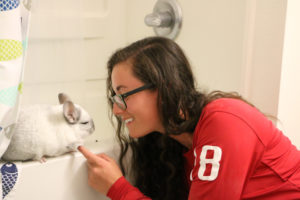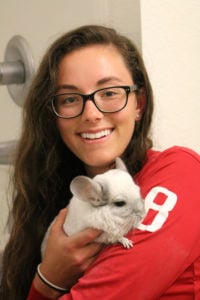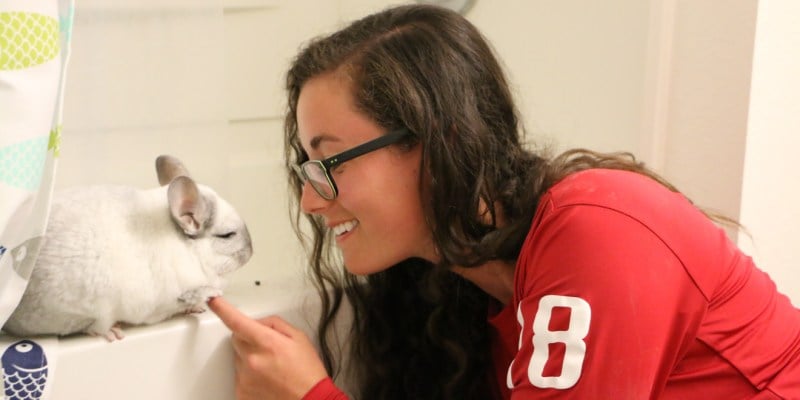
Starting in the fall of 2017, undergraduates will be allowed to live with approved support animals on two designated floors of West Lagunita Court.
Stanford Residential and Dining Enterprises (R&DE) and its partners announced the new policy on May 8. Mounting demand for these accommodations in traditional dormitory housing mainly drove the effort, according to R&DE.
The first floors of Eucalipto and Granada dorms will be the first two dorm-style areas on campus to accommodate support animals. Previously, students who required this accommodation were generally limited to apartment-style housing, like Mirrielees.
Though R&DE operates on a case-by-case basis in granting these accommodations, it believes that the pre-clearance of these two floors will have a positive impact upon students requiring a support animal, R&DE spokesperson Jocelyn Breeland wrote in an email to The Daily. With more availability for undergraduate students to live with their support animals, R&DE hopes to approve even more accommodations than it could in the past.
R&DE policy defines a support animal as “an animal that provides emotional or other support/assistance that alleviates one or more identified symptoms or effects of a person’s disability.”
These animals differ from service animals, such as guide dogs or seizure alert dogs, which are generally permitted to reside in any residential building not already designated as animal-free.
Students trying to bring a support animal to campus must undergo a more rigorous assessment by the Office of Accessible Education (OAE) than individuals with service animals. And even if students’ support animal requests are approved, the scarcity of housing where support animals can live poses another challenge in making accommodations.
In designating new dorms that are pre-approved for support animals, R&DE “wanted to make sure that students with support animals could experience life in a residence hall with other student residents,” Breeland wrote.
Breeland added that Eucalipto and Granada had the necessary “strong ventilation systems and nearby outdoor spaces … [to] lessen the impact on other residents.”

Student support
Sam Alexander ’17 recently received approval to bring a support animal to campus next year, a change that he anticipates will improve his experience on campus.
“I’m definitely looking forward to having [a support animal] in terms of making the experience even just a little bit better here [and] coping with different social and academic rigors throughout the year,” Alexander said.
While Alexander plans to live in Munger next year, he thinks that the policy regarding Eucalipto and Granada would create “a more tangible way to accomplish” the task of providing students with the accommodations they need.
“If students already know ahead of time that [living with support animals in Eucalipto and Granada] is an option, if the awareness gets out there … it will make [these accommodations] more possible,” Alexander continued.
Nina Horowitz, a first year graduate student studying bioengineering who keeps a support chinchilla named Mabel in her on-campus studio in Escondido Village, was also pleased to hear of the new policy for undergraduate students.
“I cannot possibly overstate [the importance of having a support animal],” Horowitz said. “Mabel means the world to me. When I come home at the end of the day and see her, it’s such a comfort, especially being so far away from home.”
Horowitz added that she “could see it being pretty devastating in some cases” if students were unable to find housing to accommodate their support animal.
According to Breeland, many students feel, like Alexander and Horowitz, that creating support animal-approved spaces in Eucalipto and Granada will be a positive development.
However, Horowitz also had some concerns about how students with support animals and students without them would coexist. She stressed the need to specify animal-friendly spaces and allow students to self-select into them.
“In my building we have a lot of conflict between people who do and do not have animals, so I think to have [people with support animals] all in one space makes a lot of sense,” Horowitz explained. “And on the grad student side, they have sort of done that. My studio building is one of the primary places for emotional support animals.”
Staff concerns
The new support animal program may also present additional challenges for next year’s West Lagunita staff members in creating a balanced and healthy dorm community. Staff members were informed about the program on May 8, along with the rest of the Stanford community.
Cody Carlton ’19, who will be a Resident Assistant in Granada next year, expressed excitement that “some residents will be able to have support animals for certain needs, and [that] housing will be able to see how it works … and potentially roll it out to more residences.” However, he was concerned that the program might pose unintended risks that “might not [have been] well thought out.”
He noted that, because students who listed Granada as a residence choice on their Draw application were not notified of the support animal policy until the morning of May 8, students with trepidations about living in a dorm with animals had just a few hours to make changes to their application before the 6 p.m. deadline.
“Another [concern] is that residents with animals might not be comfortable with sharing their animal with others, but might feel obliged to do so,” Carlton said, adding that the staff will need to “[work] with the owners of the animals to understand the needs of their animals and [make] sure their privacy is still respected.”
Carlton also added that staff members may face additional responsibilities, given the addition of support animals to dorm life.
“I hope we can work together with Housing, our RFs and ResEd to make sure that the animals are comfortable and have their needs met,” Carlton said. “Because they are our residents too.”
Contact Katie Keller at ktkeller ‘at’ stanford.edu.
